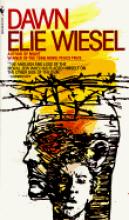Book Review: "Dawn" by Elie Wiesel
 "Dawn" is the second book in the "Night" trilogy that covers the philosophical gamut of humanity. In "Night," Wiesel's Nobel Prize winning novel, the reader relives Wiesel's real life in the German concentration camps of Auschwitz and Buchenwald but portrayed in novel form. "Dawn" covers the character Elisah's life after World War II and again finds the question of humanity at the forefront.
"Dawn" is the second book in the "Night" trilogy that covers the philosophical gamut of humanity. In "Night," Wiesel's Nobel Prize winning novel, the reader relives Wiesel's real life in the German concentration camps of Auschwitz and Buchenwald but portrayed in novel form. "Dawn" covers the character Elisah's life after World War II and again finds the question of humanity at the forefront.The main character Elisha is a member of the Movement, a Jewish terrorist group, whose purpose is to drive out the English forces from Palestine by any means necessary. Elisha was incarcerated in Auschwitz and then Buchenwald during the war and lost both of his parents in the process. When the Americans freed him, he went to France, which granted him asylum. He was preparing to enroll in Sorbonne to study philosophy when he meets Gad, a member of the Movement, in Paris. Gad came to visit him and talks fervently about realizing the age-old dream of an independent nation for the Jewish people and asks Elisha to join the Movement, which is in need of new recruits like him.
In the Movement, Elisha, only 18 years old, has completed some assignments that meant killing British soldiers, but never the one as personal as what he has to do at dawn. Elisha has to be sole executioner for British officer John Dawson. One of the movement David Ben Moshe has been captured tried and will be executed at dawn for petty crimes. The execution is the severe punishment the British are placing on all captured Movement members to "send a message." The Movement has decided to send it's own message by capturing John Dawson and telling the British if Ben Moshe is executed so will be John Dawson.
The idea of having to murder a man causes Elisha to relive many moments in his past to try to hate John Dawson and for Elisha to justify murdering a man.
The many emotions and ideals covered in this book are moving for such a short novel. Wiesel holds no bars and the reader is forced to come to his own conclusions about humanity, justice and ethics. But the novel does not necessarily try to justify Elisha's actions. In fact, while Elisha contemplates the morality of his impending action against Dawson, he admits, "I did not know the man. To my eyes he had no face; he did not even exist, for I knew nothing about him. I did not know whether he scratched his nose when he ate, whether he talked or kept quiet when he was making love, whether he gloried in his hate, whether he betrayed his wife or his God or his own future. All I knew was that he was an Englishman and my enemy."
Labels: book review, books, elie wiesel, holocaust, palestine
posted by Gil T. @ 7:38 PM Comments: 0





























